19 June 2014 (Moon Room at Summit Music Hall, Denver CO)
Sometimes, there's no justice. Thursday night in Denver couldn't seem to summon up enough interest to go out and catch some music, so the crowd was disappointingly sparse. That wasn't fair for wait staff or the bands, but all four acts on the bill took it in stride and summoned up their enthusiasm so the lucky few of us there got a full night of energetic and entertaining performances. It's just a shame there weren't more people there to appreciate Megafauna's show along with the three regional bands that opened.
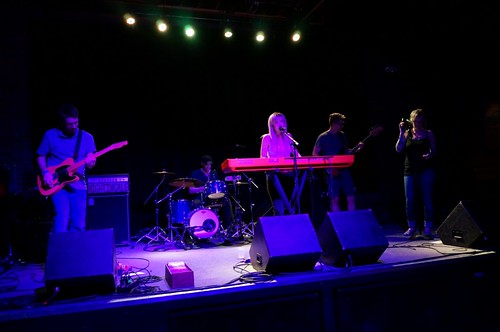
Hillary Hand & the Roseliers from Colorado Springs opened the show. Like most ampersand bands, "somebody & the somethings", the Roseliers provide a showcase for Hillary Hand's songs and voice. That's not an indictment of the band's ability; they were talented set of musicians. But they muted their own personalities and playing so that Hillary Hand was never eclipsed.
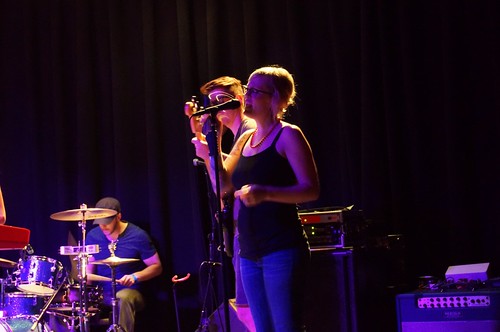
Most of the time, the players seemed caught up in their own parts, although the backup singer, Melinda Hand, did interact a bit with rest of the band and with us. Where the others either checked in with Hillary or stared down at their instruments, Melinda looked around more, smiled, and made eye contact. Unfortunately Hillary came across as fairly shy and a bit nervous, so she didn't command all the attention that she could have.
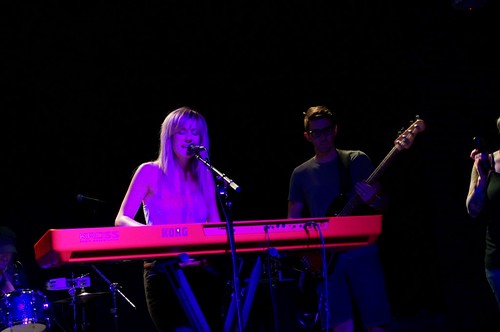
Despite that, she and Roseliers had some very good material, with interesting structures and contrasting soft and loud moments. The tunes varied a bit in style, from a light country feel reminiscent of Emmylou Harris backed by a more modern rock band to dreamy pop songs. Hand had the vocal versatility to follow along, from a subtle twanged folk to ethereal fragility. She also seemed adept at finding a harder edge under the velvet. The guitarist, Joseph Degalia, stood out the most musically, with some nice chops. He had a good ear and a subtle touch, especially on slide. He never upstaged Hand, but his fills added some complexity against her keyboard lines.
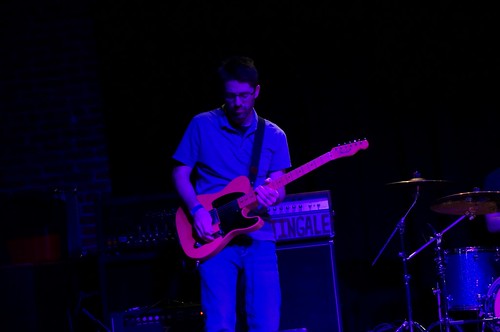
By the end of their set, I appreciated their nuanced style. Then they threw a real curve ball. "Run Like A Rabbit" launched with a synth-pop/electro-pop feel that didn't mesh with their earlier sound. The band was more than competent enough to pull it off, but it was a weird outlier. The rest of the songs had a kind of eclectic continuity, but this felt a bit odd.
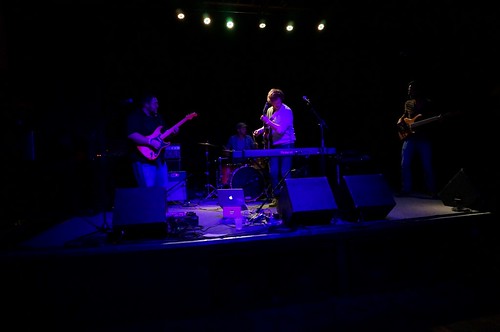
If the Roseliers had a handle on soft to loud transitions, Bear. took that a couple of levels further, playing a good set of indie rock that featured plenty of thrashy breaks. Songs would settle into a solid drive, driven by the syncopated drums and punchy bass, but then interludes of cathartic frenzy would erupt as if the band couldn't withhold any longer.
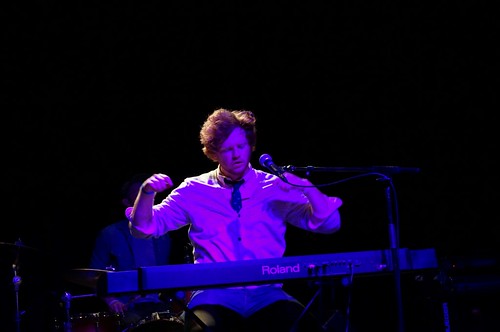
Frontman Will Livingston dominated the stage with a huge personality and big movements. With his unpredictable shifts of persona, he was entertaining like somebody's drunk uncle. He was personable and clearly meant well, but he was mercurial as he surrendered himself to the music and acted out. When he was seriously engaged in the song, he radiated an intensity, but he could flip and be fairly meta and "ironic" too. Livingston spent most of the set on guitar but switched to keys for the last couple of tunes. He flailed around less on keyboards, but he still bounced in his seat.
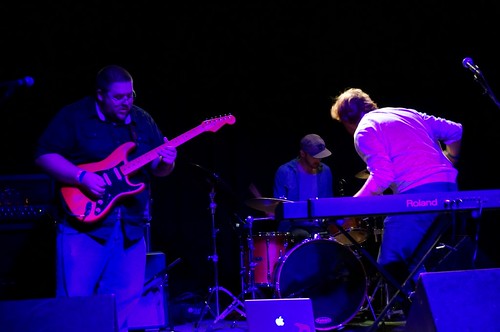
The second guitarist, Bruce Butler, didn't try to compete with Livingston. He was quiet on stage, but he was an excellent player, laying down some metallic riffage and memorable fills. Bass player Dylan Camacho was also quite focused on his playing, but had a good physical presence with constant movement as he effortlessly held the bottom end. Rather than random motion, though, he favored more choreographed moves.
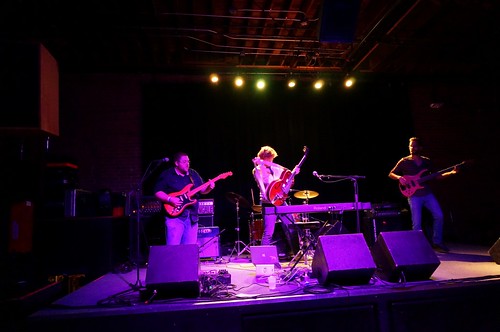
Most of their songs had a quick hard edge, but they also played a new tune that was poppy and uplifting. At the end of that final song, Livingston thanked us as it seemed to wind down, but then he ran to grab his guitar for the final chord. I'm not sure if this was a stunt or reaction to the sound problems he had had with his keyboard, but it was just another bit of sudden movement to cap their set
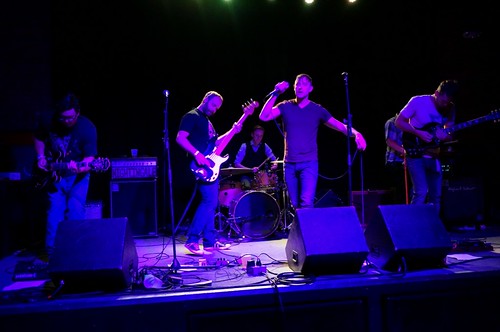
Watching Instant Empire on stage, I have no sense of how these six guys ever met and came together. Various pairs appeared reasonably matched, but overall, they seemed to come from different ages, core musical backgrounds, and fashion styles. Despite that, their music was very well-executed, with each player knowing his role and smoothly covering his part. They played a mix of punk and post-punk rock, but they had a very immediate sound, without much sense of retro aspirations.
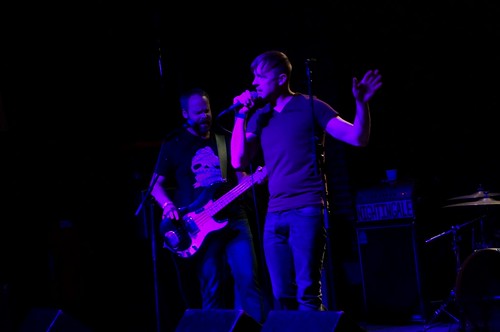
In general, I really enjoyed them, although the horrible fuzzed out keys on the first song were fairly off-putting. Imagine something like a staticky loose cable, but tuned, and you'll have an idea of what I mean. Fortunately, he picked some more complementary patches later in the set.
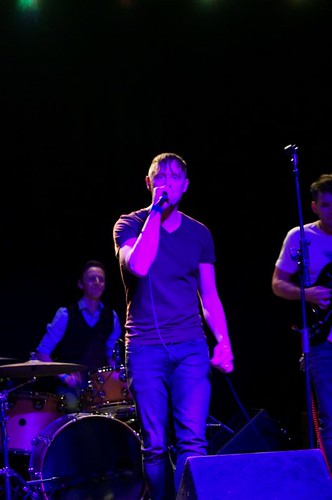
Lead singer Scotty Saunders owned the stage with his theatrical flair. Every moment had the perfect stylized gesture and facial expression. He'd prance one moment, then lunge forward menacingly in another. At times, his over-emoting got right up to the edge of campy, but never crossed over, in large part because it seemed like a natural part of his personality. It also helped that his vocals showed some diversity as they ranged from shout rap-singing to tight new wave crooning to punk proclamation. Most of the band let Saunders take the spotlight, but bass player Aaron Stone challenged him in his bid for the crowd's attention. The interaction was positive, though, with Stone being more exuberant than attention-starved.
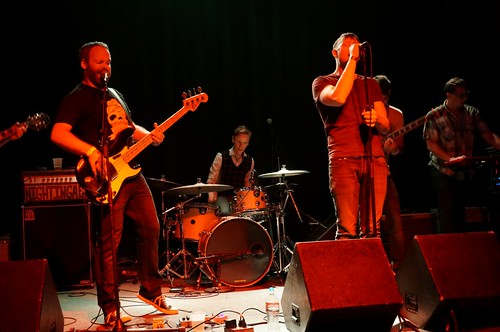
It's also worth noting that this was the first show for Instant Empire's new drummer. He did a great job keeping up with the rest of the band as they flew through the tunes in tight formation. Their show was an energetic springboard to set up Megafauna's performance.
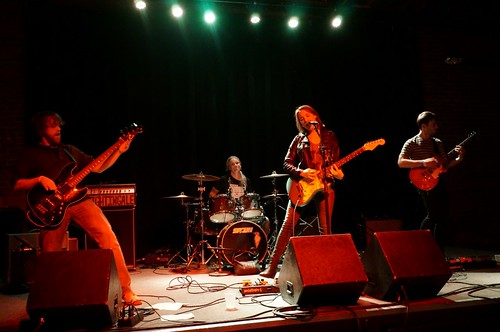
Megafauna's Dani Neff is not one of the most impressive female guitarists around, she's just one of the best guitarists period. She has enough jaw-dropping talent to sidestep the whole question of gender. Where many strong women players are forced to either trade on their sexuality or try to out-butch the boys, Neff doesn't acknowledge either of those paths as necessary or interesting. Taking in her performance at the Moon Room, I didn't miss that kind of posturing, because it was all about the music and face-melting, ear-shredding tone that Neff could wring out of her guitar.
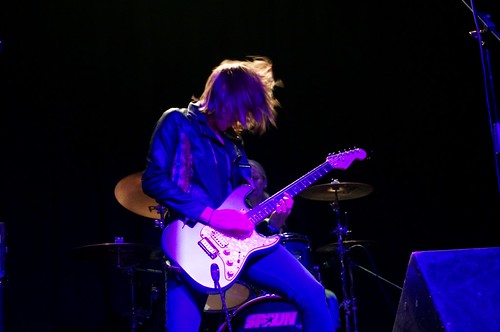
I'll confess that, like most guitarists, when I watch another player, I often think about how I would approach the piece myself and judge their skills. Someone might be a little quicker than me, but I might still feel that my phrasing or tone are better. Neff's mastery of the guitar left me nothing but humbled and grateful to witness it.
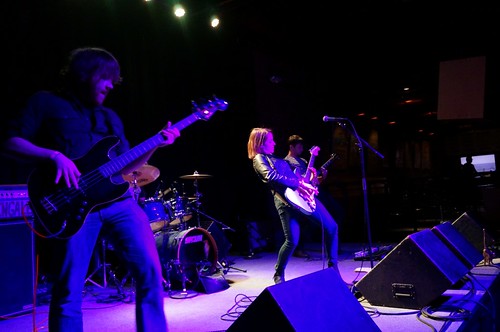
While she could have carried the show completely on her own, the rest of her band rose to the challenge, showing off their own significant technical skills. Bass player Bryan Wright was a second focal point, both musically and visually. Reflecting the band's earlier lineup as a trio, he took over some of the rhythm guitar duty, easily tracking all of the twists and turns to these songs. Drummer Zach Humphrey was a busy player, building up syncopated complexity on the straight rock sections, but also driving the more interesting time signature changes. He had a dramatic sense of dynamics; he could knock the shit out of the drums, then drop back to cymbal work when the tune called for it. I did feel a little sorry for John Musci, the rhythm guitar player, because he spent most of the set completely in Neff's shadow, but his contribution to the foundation was important.
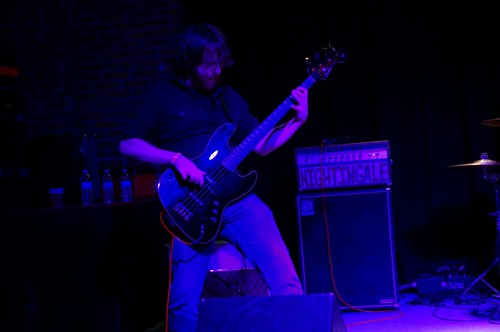
Megafauna led off with tribal drum beat and guitar whine of "Hug From A Robot," which set the stage for the rest of the night. The song borrowed heavily from classic rock, with a bit of Led Zeppelin's "Immigrant Song" crossed with Jimi Hendrix's "Crosstown Traffic". They mine some of the same veins as Earl Greyhound, juxtaposing an insistent rhythmic drive with more thoughtfully paced vocals. Like many songs in their set, the band could dissolve from a throaty roar of fuzz to shredding out a flurry of notes.
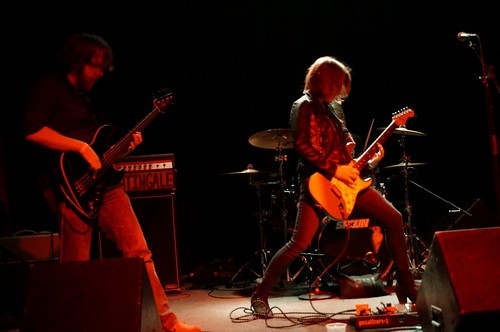
After staking out their claim to classic hard rock and then edging into early heavy metal, they quickly expanded their musical sensibility and became harder to pigeonhole. Songs might incorporate blues, then fusiony jazz. They usually stayed centered on that dark heaviness, but even if they were locked in a psychedelic grind, they could turn into utterly unique directions. This constant possibility of surprise held the audience enthralled. Hypnotized by the groove, we were carried along, whether they leaped into hardcore thrash or shifted into El Ten Eleven or Trail of Dead style post-rock. Although Megafauna favored these lightning quick stylistic jumps, they were always in service to the song, much like their surprising time or key changes.
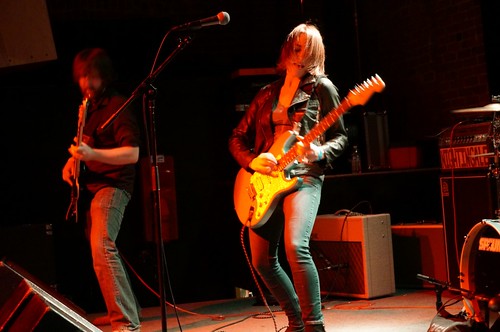
Through it all, Neff retained a rock star presence, knowing how to pose for effect, but never letting up her guitar assault. She'd casually slash at her guitar, but the sound was anything but sloppy. Even at the ecstatic height of a solo, she struck with precise control. The band's forays out from their hard rock core gave her plenty of room to vary her playing from wicked minor pentatonic runs to outside, chromatic riffs that naturally interlocked with the bass. More than just a guitarist, though, Neff adroitly covered vocals, changing character to fit each tune. One song might feature a less twangy version of X's Exene Cervenka style punk, but she could also summon a good gothy darkness like Siouxsie Sioux and a haunting, ethereal tone that suggested Björk in her saner moments. Of course, her singing didn't diminish her playing at all.
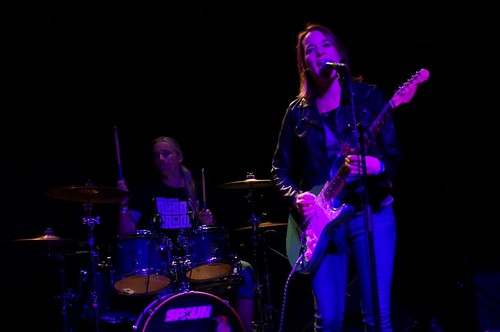
Bottom line: if talent ruled the world, we would be Dani Neff's loyal subjects. Barring that, we'll have to settle for worshipping her and Megafauna by buying their album on Bandcamp.
More photos on my Flickr.
Sometimes, there's no justice. Thursday night in Denver couldn't seem to summon up enough interest to go out and catch some music, so the crowd was disappointingly sparse. That wasn't fair for wait staff or the bands, but all four acts on the bill took it in stride and summoned up their enthusiasm so the lucky few of us there got a full night of energetic and entertaining performances. It's just a shame there weren't more people there to appreciate Megafauna's show along with the three regional bands that opened.

Hillary Hand & the Roseliers from Colorado Springs opened the show. Like most ampersand bands, "somebody & the somethings", the Roseliers provide a showcase for Hillary Hand's songs and voice. That's not an indictment of the band's ability; they were talented set of musicians. But they muted their own personalities and playing so that Hillary Hand was never eclipsed.

Most of the time, the players seemed caught up in their own parts, although the backup singer, Melinda Hand, did interact a bit with rest of the band and with us. Where the others either checked in with Hillary or stared down at their instruments, Melinda looked around more, smiled, and made eye contact. Unfortunately Hillary came across as fairly shy and a bit nervous, so she didn't command all the attention that she could have.

Despite that, she and Roseliers had some very good material, with interesting structures and contrasting soft and loud moments. The tunes varied a bit in style, from a light country feel reminiscent of Emmylou Harris backed by a more modern rock band to dreamy pop songs. Hand had the vocal versatility to follow along, from a subtle twanged folk to ethereal fragility. She also seemed adept at finding a harder edge under the velvet. The guitarist, Joseph Degalia, stood out the most musically, with some nice chops. He had a good ear and a subtle touch, especially on slide. He never upstaged Hand, but his fills added some complexity against her keyboard lines.

By the end of their set, I appreciated their nuanced style. Then they threw a real curve ball. "Run Like A Rabbit" launched with a synth-pop/electro-pop feel that didn't mesh with their earlier sound. The band was more than competent enough to pull it off, but it was a weird outlier. The rest of the songs had a kind of eclectic continuity, but this felt a bit odd.

If the Roseliers had a handle on soft to loud transitions, Bear. took that a couple of levels further, playing a good set of indie rock that featured plenty of thrashy breaks. Songs would settle into a solid drive, driven by the syncopated drums and punchy bass, but then interludes of cathartic frenzy would erupt as if the band couldn't withhold any longer.

Frontman Will Livingston dominated the stage with a huge personality and big movements. With his unpredictable shifts of persona, he was entertaining like somebody's drunk uncle. He was personable and clearly meant well, but he was mercurial as he surrendered himself to the music and acted out. When he was seriously engaged in the song, he radiated an intensity, but he could flip and be fairly meta and "ironic" too. Livingston spent most of the set on guitar but switched to keys for the last couple of tunes. He flailed around less on keyboards, but he still bounced in his seat.

The second guitarist, Bruce Butler, didn't try to compete with Livingston. He was quiet on stage, but he was an excellent player, laying down some metallic riffage and memorable fills. Bass player Dylan Camacho was also quite focused on his playing, but had a good physical presence with constant movement as he effortlessly held the bottom end. Rather than random motion, though, he favored more choreographed moves.

Most of their songs had a quick hard edge, but they also played a new tune that was poppy and uplifting. At the end of that final song, Livingston thanked us as it seemed to wind down, but then he ran to grab his guitar for the final chord. I'm not sure if this was a stunt or reaction to the sound problems he had had with his keyboard, but it was just another bit of sudden movement to cap their set

Watching Instant Empire on stage, I have no sense of how these six guys ever met and came together. Various pairs appeared reasonably matched, but overall, they seemed to come from different ages, core musical backgrounds, and fashion styles. Despite that, their music was very well-executed, with each player knowing his role and smoothly covering his part. They played a mix of punk and post-punk rock, but they had a very immediate sound, without much sense of retro aspirations.

In general, I really enjoyed them, although the horrible fuzzed out keys on the first song were fairly off-putting. Imagine something like a staticky loose cable, but tuned, and you'll have an idea of what I mean. Fortunately, he picked some more complementary patches later in the set.

Lead singer Scotty Saunders owned the stage with his theatrical flair. Every moment had the perfect stylized gesture and facial expression. He'd prance one moment, then lunge forward menacingly in another. At times, his over-emoting got right up to the edge of campy, but never crossed over, in large part because it seemed like a natural part of his personality. It also helped that his vocals showed some diversity as they ranged from shout rap-singing to tight new wave crooning to punk proclamation. Most of the band let Saunders take the spotlight, but bass player Aaron Stone challenged him in his bid for the crowd's attention. The interaction was positive, though, with Stone being more exuberant than attention-starved.

It's also worth noting that this was the first show for Instant Empire's new drummer. He did a great job keeping up with the rest of the band as they flew through the tunes in tight formation. Their show was an energetic springboard to set up Megafauna's performance.

Megafauna's Dani Neff is not one of the most impressive female guitarists around, she's just one of the best guitarists period. She has enough jaw-dropping talent to sidestep the whole question of gender. Where many strong women players are forced to either trade on their sexuality or try to out-butch the boys, Neff doesn't acknowledge either of those paths as necessary or interesting. Taking in her performance at the Moon Room, I didn't miss that kind of posturing, because it was all about the music and face-melting, ear-shredding tone that Neff could wring out of her guitar.

I'll confess that, like most guitarists, when I watch another player, I often think about how I would approach the piece myself and judge their skills. Someone might be a little quicker than me, but I might still feel that my phrasing or tone are better. Neff's mastery of the guitar left me nothing but humbled and grateful to witness it.

While she could have carried the show completely on her own, the rest of her band rose to the challenge, showing off their own significant technical skills. Bass player Bryan Wright was a second focal point, both musically and visually. Reflecting the band's earlier lineup as a trio, he took over some of the rhythm guitar duty, easily tracking all of the twists and turns to these songs. Drummer Zach Humphrey was a busy player, building up syncopated complexity on the straight rock sections, but also driving the more interesting time signature changes. He had a dramatic sense of dynamics; he could knock the shit out of the drums, then drop back to cymbal work when the tune called for it. I did feel a little sorry for John Musci, the rhythm guitar player, because he spent most of the set completely in Neff's shadow, but his contribution to the foundation was important.

Megafauna led off with tribal drum beat and guitar whine of "Hug From A Robot," which set the stage for the rest of the night. The song borrowed heavily from classic rock, with a bit of Led Zeppelin's "Immigrant Song" crossed with Jimi Hendrix's "Crosstown Traffic". They mine some of the same veins as Earl Greyhound, juxtaposing an insistent rhythmic drive with more thoughtfully paced vocals. Like many songs in their set, the band could dissolve from a throaty roar of fuzz to shredding out a flurry of notes.

After staking out their claim to classic hard rock and then edging into early heavy metal, they quickly expanded their musical sensibility and became harder to pigeonhole. Songs might incorporate blues, then fusiony jazz. They usually stayed centered on that dark heaviness, but even if they were locked in a psychedelic grind, they could turn into utterly unique directions. This constant possibility of surprise held the audience enthralled. Hypnotized by the groove, we were carried along, whether they leaped into hardcore thrash or shifted into El Ten Eleven or Trail of Dead style post-rock. Although Megafauna favored these lightning quick stylistic jumps, they were always in service to the song, much like their surprising time or key changes.

Through it all, Neff retained a rock star presence, knowing how to pose for effect, but never letting up her guitar assault. She'd casually slash at her guitar, but the sound was anything but sloppy. Even at the ecstatic height of a solo, she struck with precise control. The band's forays out from their hard rock core gave her plenty of room to vary her playing from wicked minor pentatonic runs to outside, chromatic riffs that naturally interlocked with the bass. More than just a guitarist, though, Neff adroitly covered vocals, changing character to fit each tune. One song might feature a less twangy version of X's Exene Cervenka style punk, but she could also summon a good gothy darkness like Siouxsie Sioux and a haunting, ethereal tone that suggested Björk in her saner moments. Of course, her singing didn't diminish her playing at all.

Bottom line: if talent ruled the world, we would be Dani Neff's loyal subjects. Barring that, we'll have to settle for worshipping her and Megafauna by buying their album on Bandcamp.
More photos on my Flickr.

No comments:
Post a Comment